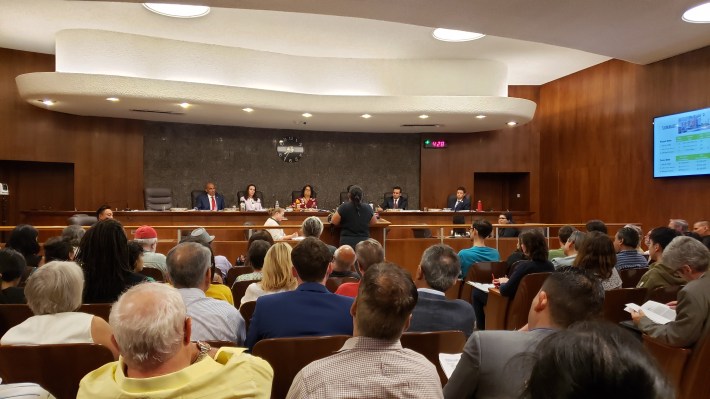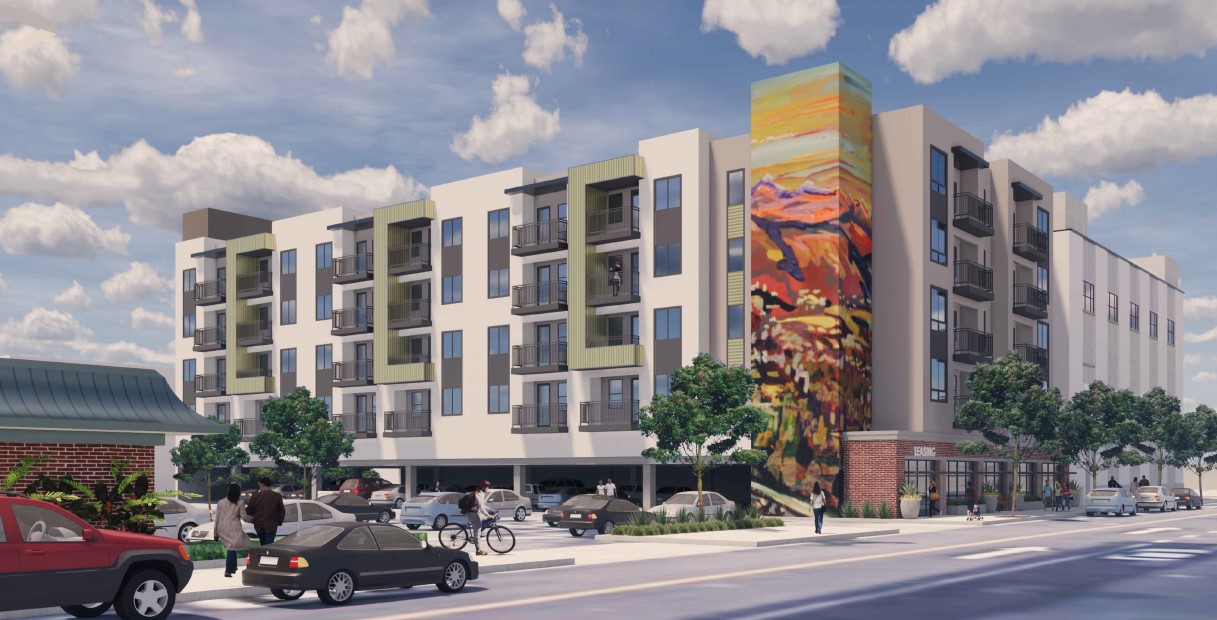This week, Alhambra’s City Council voted to move forward with a proposal that would bring 40 units of supportive and low-income housing to the city. The development is expected to cost $20 million and could house up to 178 residents.
The five-story project comes at a time when Alhambra’s homeless population has increased and the city has lagged behind in providing mixed-age affordable housing. Of all the affordable housing in the area, only four are open to all ages, while the rest are designated for seniors, said Teresa Eilers, field organizer for Everyone In Campaign, in an interview.
"Families are the largest demographic suffering from the affordable housing crisis," Eilers said.
The project will be located between Second and Third Street, less than a block south of Main Street and adjacent to the Alhambra Civic Center Library and Alhambra High School. Twenty of the units would be one-bedroom supportive housing units, meaning they would be made available to people who earn 30 percent of the area median income. Nineteen units would be 1- and 2-bedrooms for very low-income residents, or people who make 50 percent of the area median income.
The approved proposal asks the city to allocate roughly $2 million toward the project through a three percent residual loan. The city would maintain ownership of the land but would enter into a long-term ground lease with the developer.
The city council’s decision directed city staff to enter into exclusive negotiations with the team of American Family Housing (AFH) and National Community Renaissance (National CORE). The exclusive negotiating agreement will still need approval at a future council meeting.
For the past couple of years, city staff have worked to see what could be done on the roughly half-acre city-owned parcel. After staff analyzed the city's underutilized and vacant lands to see what would be a good fit for multi-family housing, the Second-Third Streets lot, which is currently used as a surface parking, was considered the best immediate option. It is the city’s largest single vacant city-owned lot, according to the city's staff report.

In July, city staff started a bidding process for proposals for affordable housing bids from non-profit developers. From July 12-August 22, city staff sent the open bid notice to 14 affordable housing developers, the Southern California Association of Non-Profit Housing to share with their membership, and was posted on the city website. The city received bids from 1) AFH Housing and National CORE, 2) Little Tokyo Service Center and 3) Affirmed Housing Group Inc. Of the three bids, only Affirmed Housing Group, Inc. proposed a senior housing project.
In Monday’s discussion, the choices were narrowed down to the proposals by AFH/National CORE and Little Tokyo Service Center. The Little Tokyo Service Center proposed a 48-unit development with 18 studios, 18 one-bedroom, and 12 two-bedroom supportive and low-income housing.
While the LTSC and AFH-National CORE proposals were similar, the inclusion of studios in LTSC's proposal tipped the scales toward its competitor. David Mejia, district 4 council member, led the criticism saying that LTSC’s proposal's inclusion of studios took away potential housing for families. "The reason why I pick American Family Housing, National CORE is because I think even though it gets eight units less, we're getting bedrooms that could probably fit three or four people," Mejia said.
Takao Suzuki, LTSC’s director of community economic development, said that studio units would most likely be for individuals, but that there is a high need for such units. Suzuki added that while their bid was an initial proposal, there would've been flexibility built into the project and could've been adjusted after community outreach was received.

The top two bids also differed in how the developments would be constructed. Responding to a question from Alhambra Mayor Adele Andrade-Stadler, Chris Killian, Senior Vice President of Construction, said that AFH-National CORE proposed fabricating the development off-site. Killian said that fabricating the building offsite could help minimize the time the construction would disrupt the area and help anticipate mistakes in the factory instead of at the construction site. Yet, while building off-site would keep costs down, workers doing the fabrication would not receive a prevailing wage — workers on the Alhambra site would receive one.
Suzuki said LTSC planned a traditional construction with everything built on-site and paying prevailing wages throughout the entirety of the construction.
The city council and the public comments ultimately voiced their support for the effort to add more affordable housing. Monday’s meeting packed the council chambers with people left standing near the entrances.
Dioselina Gallarde, a coordinator at First Baptist Church of Alhambra, said that she and her child became homeless for a month in 2017. Since then, she's become an advocate at her church to assist other homeless residents, but that it's only a small effort in comparison to what the city could do. "We provide as much support as we can. It’s a little bit that we’re doing and we know you can do a lot more for them," Gallarde said.
Melissa Michealson, a resident of Alhambra's Emory Park, said she thought it was refreshing to see Alhambra support a supportive housing project. "Everyone needs to pitch in and help and it's about time Alhambra does its part," said Michaelson.






